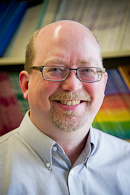To the lay person, College and Career Readiness – or "CCR" – happens in high school, when a young person turns their full attention to what they want to do with the rest of their life.

However, school counselors know that CCR doesn't happen in only the four years of high school. Instead, it is about "identifying all those things that we think students need to be capable of doing as they transition through school and prepare themselves for an investment in lifelong learning," says David Duys, an associate professor in the University of Iowa College of Education's School Counseling Program, who also notes the sooner career exploration is introduced to a student, the better.
Duys discusses in detail each stage of a student's academic journey and how the experiences in each build on the previous to remind all that college and career readiness truly begins in elementary school with such simple tasks as role playing.
"That would involve trying on uniforms and holding equipment and, perhaps, even being invited to a work-related site to experience the environment," says Duys, who notes that it's never too early to begin developing leadership and problem-solving skills, and the ability to work through and troubleshoot problems.
"Providing students with simulated kinds of activities, fun activities to help them build that sense of confidence and develop some of those skills. These are the kinds of early exposure things we like to see."
CCR continues through the middle school years, which Duys suggests begins a period of personal reflection for students. "They begin to engage in a meaningful exploration of interest inventories. They do more research on things like time demands and the kind of education that might be required for a particular occupation. They also experiment with job shadowing."
Once in high school, CCR becomes even more top of mind for students. Their exploration dives to an even deeper level. Internships, volunteer work, and meaningful connections with mentors are often part of their plan, regardless if that plan includes attendance of a four-year college.
"(School counselors at every level, not just high school) consider it a disservice to students if we don't get them ready for post high school training, (post) high school education. We want to prepare them for all those options and to get them ready for a variety of career paths that they may be interested in pursuing," adds Duys.